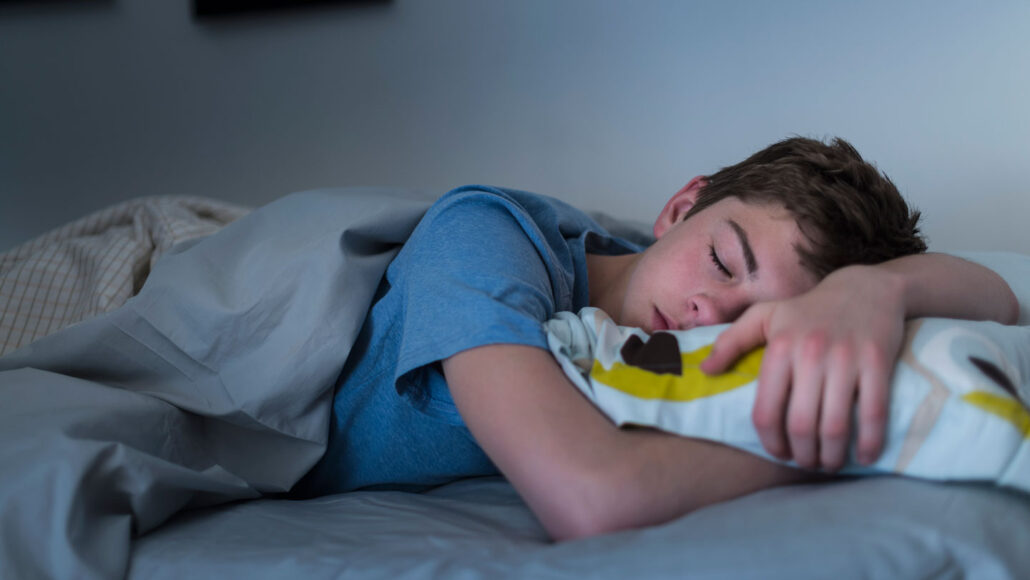Let’s learn about sleep
Sleep is key for health and wellbeing — but early school start times and screen time make it harder for teens to get shuteye

Sleep benefits mental and physical health in many ways, from preventing overeating to warding off bad moods.
Tetra Images/Getty Images
This story is going to be a total snooze-fest. No, really. Sleep is awesome! It’s vital to our health and wellbeing. And we should talk about it more, especially because many of us don’t get enough sleep — which means we’re missing out.
People spend about a third of their lives sleeping. That might sound like time wasted, but it’s not. Even in a deep slumber, the brain is busy. It’s hard at work sorting memories, cleansing itself of harmful wastes and more. This time of rest also helps the body build stronger bones and heal wounds faster. Well-rested people tend to be happier and more alert during the day. Plus, they tend to deal better with stress.
Experts recommend that teens get about nine hours of sleep each night. But surveys show that teens are getting less and less sleep. Only about one-third of 18-year-olds now report getting at least seven hours of sleep per night. And that’s a problem. Lack of sleep has been linked to unhealthy eating and feeling more anxious. Sleep-deprived people also have higher risk of feeling depressed, using alcohol or drugs, or getting in car accidents.
It’s hard to say exactly why teens have become more sleep-deprived. One factor may be school start times. As people go through puberty, they become natural night owls. Their bodies don’t release the hormone melatonin — which tells the brain it’s time for bed — until later at night. This shifts their circadian rhythm such that sleep comes most easily between 11 p.m. and 8 a.m. But most public middle and high schools in the United States start before 8:30 a.m.
Another reason for teens’ widespread sleep shortage may be screens. Survey data from 370,000 U.S. teens has shown an increase in trading sleep for screentime. But losing sleep to screens isn’t just a matter of choosing to stay up later. The light emitted by phones, laptops and other devices makes the brain resist sleepiness. That’s because the glow contains blue wavelengths also found in sunlight. This tricks the brain into thinking it’s daytime.
Research suggests that people who use screens in bed have a harder time nodding off. New LED tech could lessen that effect. But in the meantime, experts suggest putting away electronics at least 30 minutes before bed. It might be hard to ex out of a lively group chat or save the next episode of a show until tomorrow, but turn off and turn in. Your body and brain will thank you.
Want to know more? We’ve got some stories to get you started:
Compared to other primates, humans get little sleep Most other primate species sleep nine to 15 hours a night, while humans average just seven. (4/9/2018) Readability: 7.6
Analyze This: Sleep patterns vary widely across the world Data on four very different groups of people show that sleep patterns vary based on the local environment, the culture and daily schedules. (5/24/2017) Readability: 6.3
Left brain stands guard during sleepovers This may explain why a sleepover at a friend’s home or the first night at some vacation spot may not be restful. (5/11/2016) Readability: 7.1
Explore more
Explainer: The teenage body clock
Sleep and physical health
Sleep helps wounds heal faster
Strongest bones come from Goldilocks recipe of exercise and rest
Out-of-whack body clock causes more than sleepiness
Study equates sleepless nights with high-fat diet
Food smells better to sleepyheads
Don’t snooze on getting enough sleep
Why sleeping in on the weekend won’t work
Sleep and mental health
For teens, a good mood depends on good sleep
Do you sleep enough to banish unpleasant moods?
Sleep helps teens cope with discrimination
Sleepless nights can leave brains feeling anxious
Sleep may jumpstart the brain’s power washing system
Nodding off may turn your creativity on
Catching ZZZs may retrieve lost memories
Sleep and screentime
Evening screen time can sabotage sleep
Sleep-friendlier lighting is on the way
Screen time can mess with the body’s ‘clock’
Trading smartphone time for sleep? Your loss
Evening screen time can sabotage sleep
Activities
How healthy is your sleep schedule? Find out by keeping a sleep diary. Track when you wake up and go to bed, as well as daytime activities that can affect sleep — such as exercise, drinking caffeine and napping. This can help you find out whether you’re budgeting enough time for sleep, or if any part of your daily routine might be making it harder to get enough shut-eye. For advice on getting a better night’s sleep, check out these tips for improving your “sleep hygiene.”







